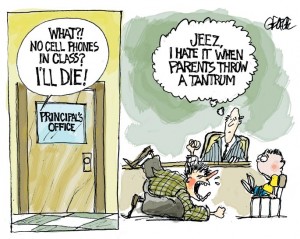|
|
January 8, 2011
 AP Photo/Jose Luis Magana Forgive me if I’m not my usual perky self. It hasn’t been a great news day for those of us hopeful about the inherent goodness of humankind.
Let me explain. This morning I read about the arrest of six kids in Carson City, Nevada. What had these 12 and 13 year olds girls done? Apparently one dreamed up a Facebook event called “Attack a Teacher Day” and invited 100 students to join. The other five got busted for responding to online threats against specific teachers in two middle schools. According to the Minneapolis-St. Paul Star Tribune the six girls were “booked Wednesday at juvenile hall on a misdemeanor charge of communicating threats.” Thankfully a parent saw the “invite” and deleted it. No one was physically harmed.
Thinking about it, there’s so much wrong here I didn’t know where to begin. So I posted to my anti-bullying forum Cruel’s Not Cool! to start a discussion. I posed some questions: What might have been going on in the mind of a kid who thought that “attacking” teachers was a terrific idea? Why might the participants have decided to get on the bandwagon? What role does Facebook or any social media site have in monitoring illegal content like threats to someone’s life? In what ways might the charges against the tweens be totally appropriate or totally absurd? What’s the role of parents in raising kids of good character and teaching their tech savvy darlings to be responsible digital citizens?
But before any responses were posted, I read about an actual attack this afternoon. A politically motivated assassination attempt on the life of Rep. Gabrielle Giffords (D-AZ). The Congresswoman took a bullet through the brain and she’s currently in critical but stable condition. So far at least 6 people are dead. Among them, an aide for the Congresswoman, a 9-year-old and U.S. District Judge John Roll.
Kids openly tease, harass, persecute and physically attack peers whom they “don’t like.” If school bullying and disrespecting teachers is ‘no big deal’ (and many students say “nothing happens” when bullying is reported), it may not take much reasoning to conclude that it’s also OK to gun down someone we disagree with. Not that anyone capable of this behavior has much in the way of reasoning powers, but you don’t need that to buy a gun.

November 22, 2010
In a rare but not unprecedented move, we sent our intrepid Time Traveler back to the late 1980s to report on the historic role of parents in their children’s education. What she uncovered may be hard for us 21st Century parents to believe, but we’ve verified her account by cross-referencing it with archival documents as well as first hand reports from today’s Elders and young adults who swear this is the way it was. Her report is excerpted here:
On weekdays during the 1980s, parents kissed their kids goodbye at the front door and sent them out into the world. The children either marched themselves to a bus stop, walked to school or rode a bike (yes they had helmets, though nowhere as cool as the ones we’ve got) From the moment they turned the corner, parents could not directly communicate with their kids.
WARNING: If you find yourself feeling anxious reading the above, we recommend putting your head between your knees and breathing in slowly through your nose and exhaling slowing through you mouth. If that doesn’t alleviate your symptoms, shut down your computer and take a warm bath, with or without bubbles.
All during morning classes, lunchtime, recess, afternoon classes and onsite after school programs, kids were incommunicado. You’re probably wondering, “What if the kid left a lunch, a book or assignment at home? How could Mom or Dad rush to school to help if they didn’t know there was a problem?” The teachers and school administrators of the ’80s had a simple answer for that one: If the kid doesn’t bring something (s)he needs to schoool, then the kid figures it out and deals with the consequences. Period.
Cruel and unusual punishment, granted, but that’s the way it was.
In case you’re shaking your head thinking, “That sounds like a lockdown!” 20th Century schools weren’t entirely lacking compassion. For example, if a kid complained of a headache, (s)he asked the teacher’s permission to go to the office where she’d plead her case to the school nurse and likely be given an opportunity to rest quietly. If the nurse felt the situation warranted it, the school placed a call home or to the parents’ office and the problem was solved. Are they for real?! Think of the precious moments lost using that antiquated system!
 Today, thankfully, we can call and/or text our kids at any time, including 9-3 and we do…often! Yet, apparently, some schools are cracking down on in-class cellphone use. They say the constant ringing and buzzing is a distraction to teachers and any students interested in receiving an education. (What kind of lame excuse is that?) In addition, schools limiting students’ cellphone access also justify it by saying the policy reduces in-class cheating and cyber-bullying. Hmm. Well, maybe we can see some logic there, but who cares?! Schools have no right to prioritize education over a parent’s access to their children. This is the 21st Century, Ms. Principal, and these are Anxious Times. Today, thankfully, we can call and/or text our kids at any time, including 9-3 and we do…often! Yet, apparently, some schools are cracking down on in-class cellphone use. They say the constant ringing and buzzing is a distraction to teachers and any students interested in receiving an education. (What kind of lame excuse is that?) In addition, schools limiting students’ cellphone access also justify it by saying the policy reduces in-class cheating and cyber-bullying. Hmm. Well, maybe we can see some logic there, but who cares?! Schools have no right to prioritize education over a parent’s access to their children. This is the 21st Century, Ms. Principal, and these are Anxious Times.
Your thoughts?

November 12, 2010
The following parent’s “pledge” was originally written for and posted on SafetyWeb.com. SafetyWeb is a thoughtfully designed tool that provides parents with a means and a context for ongoing family conversations about safety, friendship and how the choices we make, online and off, have consequences.
 FOAD!! 3 out of 4 t(w)eens regularly use social media. (UPDATE Oct. 2013: The proportion of teens who say they don’t use social networks fell from 6% earlier this year to 2% the latest survey reports.) While the young ‘uns are scary good at navigating the tech, when it comes to connecting the dots between their digital choices and the resulting social consequences, most of them are clueless. If your kid has a cellphone and access to the Internet it’s up to you to teach them how to behave.
Q: If you don’t, who will?
A: Their equally clueless friends.
As a parent, I pledge to do the following to raise a responsible Netcitizen and teach my child about online safety:
- Social media is part of my child’s world. As a Safety Conscious Digital Parent, I pledge to do my best to raise my child to be a responsible digital citizen.
- I pledge to support my child’s use of age-appropriate social networking sites and to teach my child how to play safe and stay safe online so (s)he can grow in positive ways from online activities.
- I pledge to teach my child the difference between what is and what is not responsible and appropriate online behavior. That includes teaching my child the best ways to respond to anything online that makes him/her uncomfortable, angry or scared.
- I pledge to help my child understand the risks of giving out or posting personal information publicly online. (including photos, age, last name, name of school, home address, phone number.)
- Digitally-savvy kids’ “status anxiety” (their need to be accepted) affects their online behavior. My child has the right to choose his/her friends, but not the right to demean, harass or intimidate others. I pledge to make sure (s)he gets this message and acts accordingly.
- I pledge to have open, respectful dialogues with my child about how (s)he uses the services I give her access to online. When my child messes up (it’ll happen), I pledge to use the opportunity to teach him/her more socially acceptable behavior.
- I pledge to help my child discern between a true friend and someone with bad intentions, so that (s)he can use good judgment regarding online “friends,” as well as his/her own behavior.
- I pledge to educate my child on how their public online activity leaves a lasting digital footprint that teachers, college admissions officers, or future employers may see.
- I pledge to help my child understand the implications of online behavior so that my child can maintain his/her privacy, safety and good reputation while we keep a healthy, trusting and mutually respectful relationship between us.
You don’t need me to tell you why this stuff is import. So… can we all count on each other to do this?

October 30, 2010
This article was originally written for and posted on SafetyWeb.com. SafetyWeb is a thoughtfully designed tool that provides parents with a means and a context for ongoing family conversations about safety, friendship and how the choices we make, online and off, have consequences.
 Thanks for respecting me, Mom. If your kids are 11-17, congrats! You’ve made it to the Major League of parenting. With little ones, you didn’t need fancy plays since you called all the shots. Now there’s often grumbling in the bullpen and effective parenting is all about nuance and negotiation.
As t(w)eens step up and make more of their own decisions, parents need to gradually step back. But your job’s not done yet! Kids still need us to be plugged in and monitoring their physical, social and emotional well-being. With 3/4 of middle and high school students actively engaged in social media, they need us more than ever.
But when does conscientious monitoring of young digital citizens cross the line and become disrespectful and intrusive? Good question! Hold that thought.
Just for the record, if you’ve got evidence or a vague sense that your child is engaging in harmful activities or is being hurt, threatened or harassed, monitor the situation very closely. Act on your gut. Question your kid at length. Tell what you know, suspect and fear. Dig deep and don’t give up until you get to the bottom of what’s going on. Then offer your strongest support, providing your child the help (s)he needs and follow up!
But what if nothing’s going on? How closely should you monitor then? I often hear from good, drug-free kids, who get excellent grades. They’re indignant because Mom/Dad snoop through their email and cell phones for no known reason. They’re exhausted by a so-called Velcro parent who can’t let go and constantly texts and phones their kids all the day.
In case you’re thinking: “I have the right to check in with my kid whenever I want and to know everything my kid’s doing at all times!” With all due respect, if you don’t have probable cause for poking into the personal exchanges your kids have with their peers, you shouldn’t. All kids, especially teens, have the right to a degree of privacy.
How much privacy? How much freedom? At what age? Depends. I don’t know your child or his track record for making responsible choices when you’re not around. Besides, parenting isn’t a science, it’s an art. We’re all artists, trying to figure out how to use our tools to launch a masterpiece, i.e., a fully functioning young adult. Unfortunately, there are no easy answers. But the most effective parents create and maintain healthy boundaries with their kids.
In 21st Century parent-speak the word “boundaries” often means “rules.” As in: Parents set up the rules and the kids (hopefully) comply. This top-down, one-way approach can lead to rebellion in the ranks. Family rules are part of any discussion of boundaries, but the fact is, healthy boundaries are a two-way street. Our personal boundaries deserve respect and so do our kids’. For example:
You politely inform your 13 year old she can’t go out with her friends because she didn’t keep her agreement to finish her homework first. Furious, she blasts you with a choice sampling from her name-calling inventory. Boundary alert! Your daughter disrespected you. She deserves a consequence from you so she doesn’t think for one minute that her behavior was acceptable.
Your 14 year old mumbles something about Coach being a “jerk” for not letting the boy start in tomorrow’s game. Incensed, you grab your phone. Your son shouts, “Don’t! I’ll handle it!” Ignoring him, you call Coach and give the “jerk” an earful. Double Boundary alert! By disregarding your son’s wishes, you disrespected him. You also rudely overstepped your parenting role by intervening between coach and student.
We all want our kids’ respect. That’s why we’ve got to hold them accountable for respecting our boundaries. While we’re at it, we need to respect their boundaries too. Great advice, though not always easy to follow. But like I said, parenting is an art… you’ve got to practice to improve. Besides, we’re not looking for perfection, just progress.
 — Older Posts »
| |















